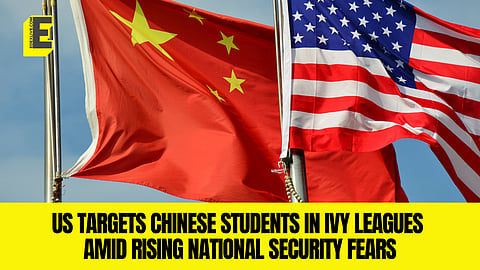

For decades, the United States’ Ivy League institutions symbolised the pinnacle of academic aspiration. But that dream is now under siege.
And nowhere is the shift more visible than in how America treats students from China, said a report by The Times of India.
A series of dramatic moves by the US government has laid bare a new doctrine: national security over academic exchange. And at the centre of this storm is Harvard University.
In an unprecedented move, the Department of Homeland Security (DHS) revoked the university’s certification to host foreign students — a dramatic blow that jeopardises the legal status of over 6,000 international students, nearly 25 per cent of whom are Chinese nationals.
Homeland Security Secretary Kristi Noem accused Harvard of “coordination with the Chinese Communist Party” and fostering “a toxic campus climate of antisemitism.”
National security officials argue that the threat is not limited to individuals but baked into the financial architecture of higher education itself.
Since 2020, Harvard has received over USD 151 million from foreign governments, much of it from China. One of its largest donors is Ronnie Chan, a real estate tycoon linked to the China-United States Exchange Foundation — a group registered as a foreign principal in the US.
What once seemed like cosmopolitan fundraising is now viewed through a different lens: as backdoor access for foreign influence, soft power projection, and intelligence-gathering.
For Chinese students, the fallout is immediate and deeply personal.
“There’s a growing fear among us,” one Chinese graduate student told TNN.
“We came here to learn and contribute. Now we’re treated as threats,” the student added.
Some students are already reconsidering their futures. “I want to return to China after graduation,” another student told The New York Times, citing concerns over visa revocations, surveillance, and discrimination.
Universities, meanwhile, are scrambling to respond. Legal experts warn that the US risks undermining its global academic standing.
“This isn’t just about Harvard,” said an immigration attorney in Boston, “This affects the credibility of the entire US education system.”
